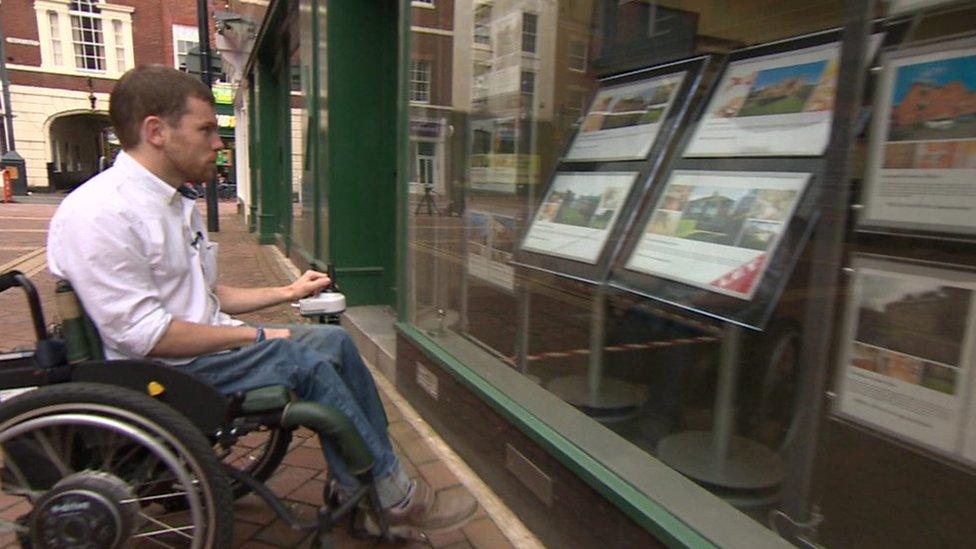'Nightmare' rental shortage for disabled people, EHRC finds
- Published
One city, seven agents... and nowhere I can live
The dire shortage of private rental properties suitable for disabled people has been exposed by a new report.
The Equalities and Human Rights Commission said 93% of 8.5 million rental properties in the UK were not accessible to the disabled.
It called on ministers to take action to improve housing accessibility.
The government said it was providing councils with almost £1bn over the next two years to adapt properties for disabled people.
"We expect landlords to adapt properties for tenants. We are clear they must not unreasonably withhold consent if they are asked to make changes to homes," a Department of Housing, Communities & Local Government spokesman said.
The EHRC said its 18-month review found 365,000 disabled people were in homes unsuitable for their needs.
"Accommodation for disabled people in this country is not acceptable," said David Isaac, chairman of the commission.
"The lack of accessible housing stops disabled people from being able to live independently."
Neil Heslop, chief executive of the Leonard Cheshire disability charity, said the report was a "shocking indictment of how disabled people have largely been forgotten in the housing priorities of local and national government".

'Something of a nightmare'

By BBC news reporter Ellis Palmer
It's difficult enough trying to find somewhere to live when you're able-bodied; it can be something of a nightmare when you have a disability.
I recently visited seven estate agents in Derby, where I have family, to try to find a property I could move into without having to make any adaptations.
Despite looking at hundreds of listings, no accessible properties were available to rent on the private market in the city.
Even getting in and out of the estate agents' shops was rather difficult. Five of the seven I visited had significant steps up, meaning I was not able to get in independently.
Finding somewhere to live independently as a wheelchair user is extremely difficult. In my case, all I need is a wet room bathroom to be able to shower myself.
Many young people, with or without disabilities, face an uncertain economic climate due to short-term contracts, meaning that buying somewhere with a mortgage on the private market just isn't possible.
Additionally, for disabled people, only 7% of homes in England offer minimal accessibility features.
Theoretically, newer properties are much more likely to be easily accessible, but that doesn't necessarily mean they will be ready for me to move into independently.
Many of the flats I've looked around in the past few years don't even have that - many still have baths or showers with steps up.

The EHRC report said many local authorities in England, Scotland and Wales have not collected data or planned for the future, even though the number of disabled people is increasing.
It found that councils are only requiring about four in ten new homes to be accessible and adaptable, while just 5% required developers to construct wheelchair-accessible housing, which might include step-free bathrooms.
Just seven councils authorities have taken either formal or informal action against a developer who did not deliver the required number of accessible and/or adaptable properties, it found.
The Equality Act (2010) says that changes or adjustments should be made to ensure someone with a disability has access to housing and that the individual should not have to pay.
But adjustments only have to be made if it is reasonable and there is only a duty to do so if not doing so places the disabled person at a substantial disadvantage.